Dementia Care and Legal Aspects
VerifiedAdded on 2020/05/28
|10
|2199
|115
AI Summary
This assignment examines the multifaceted landscape of dementia care, encompassing its legal ramifications and the latest research findings. It necessitates an in-depth understanding of the UK's Care Act 2014, particularly regarding mental capacity and safeguarding vulnerable individuals within a dementia care context. The assignment also analyzes research trends on dementia prevalence, early diagnosis, intervention strategies, and ethical considerations surrounding end-of-life care.
Contribute Materials
Your contribution can guide someone’s learning journey. Share your
documents today.

Running head: UNIT 40
Dementia care
Name of the Student
Name of the University
Author Note
Dementia care
Name of the Student
Name of the University
Author Note
Secure Best Marks with AI Grader
Need help grading? Try our AI Grader for instant feedback on your assignments.
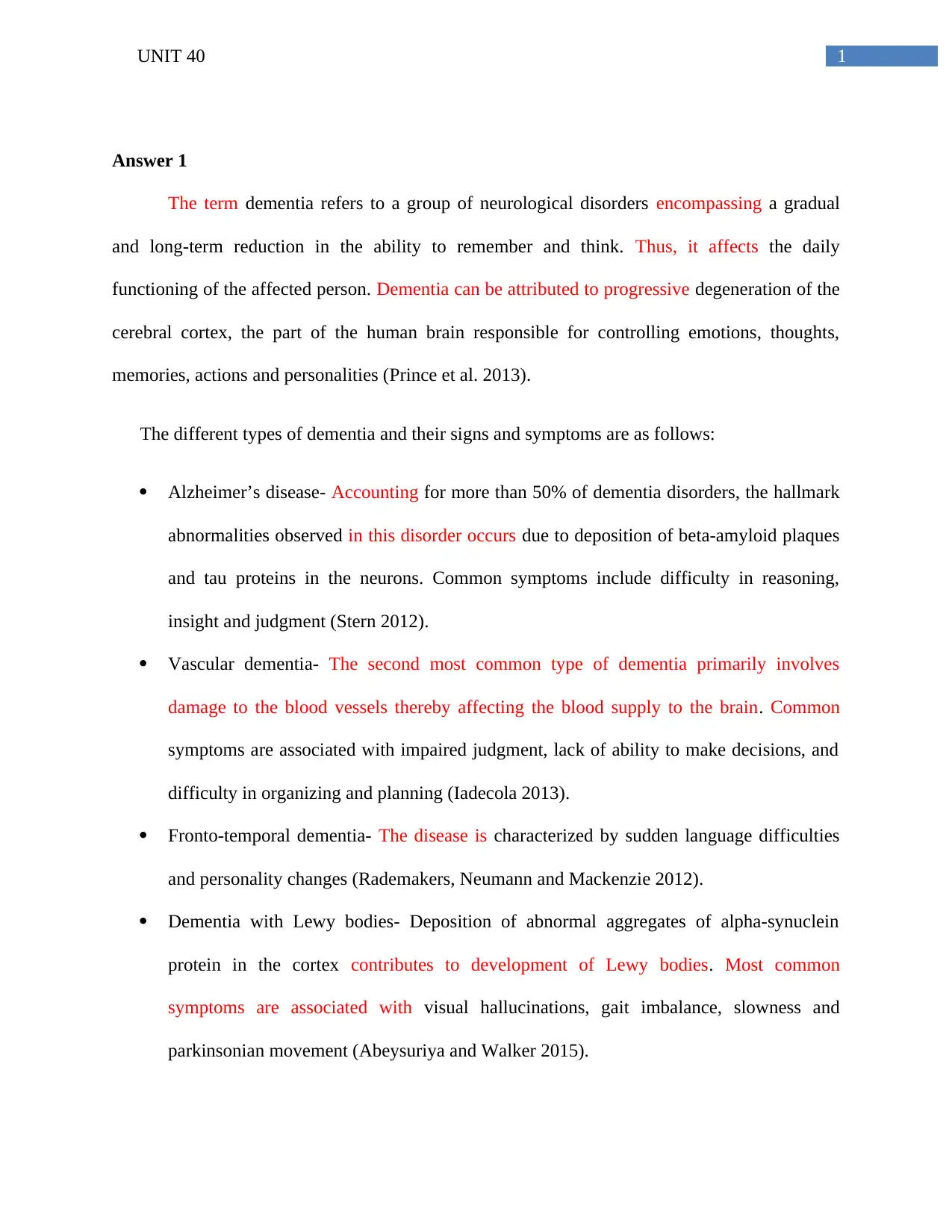
1UNIT 40
Answer 1
The term dementia refers to a group of neurological disorders encompassing a gradual
and long-term reduction in the ability to remember and think. Thus, it affects the daily
functioning of the affected person. Dementia can be attributed to progressive degeneration of the
cerebral cortex, the part of the human brain responsible for controlling emotions, thoughts,
memories, actions and personalities (Prince et al. 2013).
The different types of dementia and their signs and symptoms are as follows:
Alzheimer’s disease- Accounting for more than 50% of dementia disorders, the hallmark
abnormalities observed in this disorder occurs due to deposition of beta-amyloid plaques
and tau proteins in the neurons. Common symptoms include difficulty in reasoning,
insight and judgment (Stern 2012).
Vascular dementia- The second most common type of dementia primarily involves
damage to the blood vessels thereby affecting the blood supply to the brain. Common
symptoms are associated with impaired judgment, lack of ability to make decisions, and
difficulty in organizing and planning (Iadecola 2013).
Fronto-temporal dementia- The disease is characterized by sudden language difficulties
and personality changes (Rademakers, Neumann and Mackenzie 2012).
Dementia with Lewy bodies- Deposition of abnormal aggregates of alpha-synuclein
protein in the cortex contributes to development of Lewy bodies. Most common
symptoms are associated with visual hallucinations, gait imbalance, slowness and
parkinsonian movement (Abeysuriya and Walker 2015).
Answer 1
The term dementia refers to a group of neurological disorders encompassing a gradual
and long-term reduction in the ability to remember and think. Thus, it affects the daily
functioning of the affected person. Dementia can be attributed to progressive degeneration of the
cerebral cortex, the part of the human brain responsible for controlling emotions, thoughts,
memories, actions and personalities (Prince et al. 2013).
The different types of dementia and their signs and symptoms are as follows:
Alzheimer’s disease- Accounting for more than 50% of dementia disorders, the hallmark
abnormalities observed in this disorder occurs due to deposition of beta-amyloid plaques
and tau proteins in the neurons. Common symptoms include difficulty in reasoning,
insight and judgment (Stern 2012).
Vascular dementia- The second most common type of dementia primarily involves
damage to the blood vessels thereby affecting the blood supply to the brain. Common
symptoms are associated with impaired judgment, lack of ability to make decisions, and
difficulty in organizing and planning (Iadecola 2013).
Fronto-temporal dementia- The disease is characterized by sudden language difficulties
and personality changes (Rademakers, Neumann and Mackenzie 2012).
Dementia with Lewy bodies- Deposition of abnormal aggregates of alpha-synuclein
protein in the cortex contributes to development of Lewy bodies. Most common
symptoms are associated with visual hallucinations, gait imbalance, slowness and
parkinsonian movement (Abeysuriya and Walker 2015).
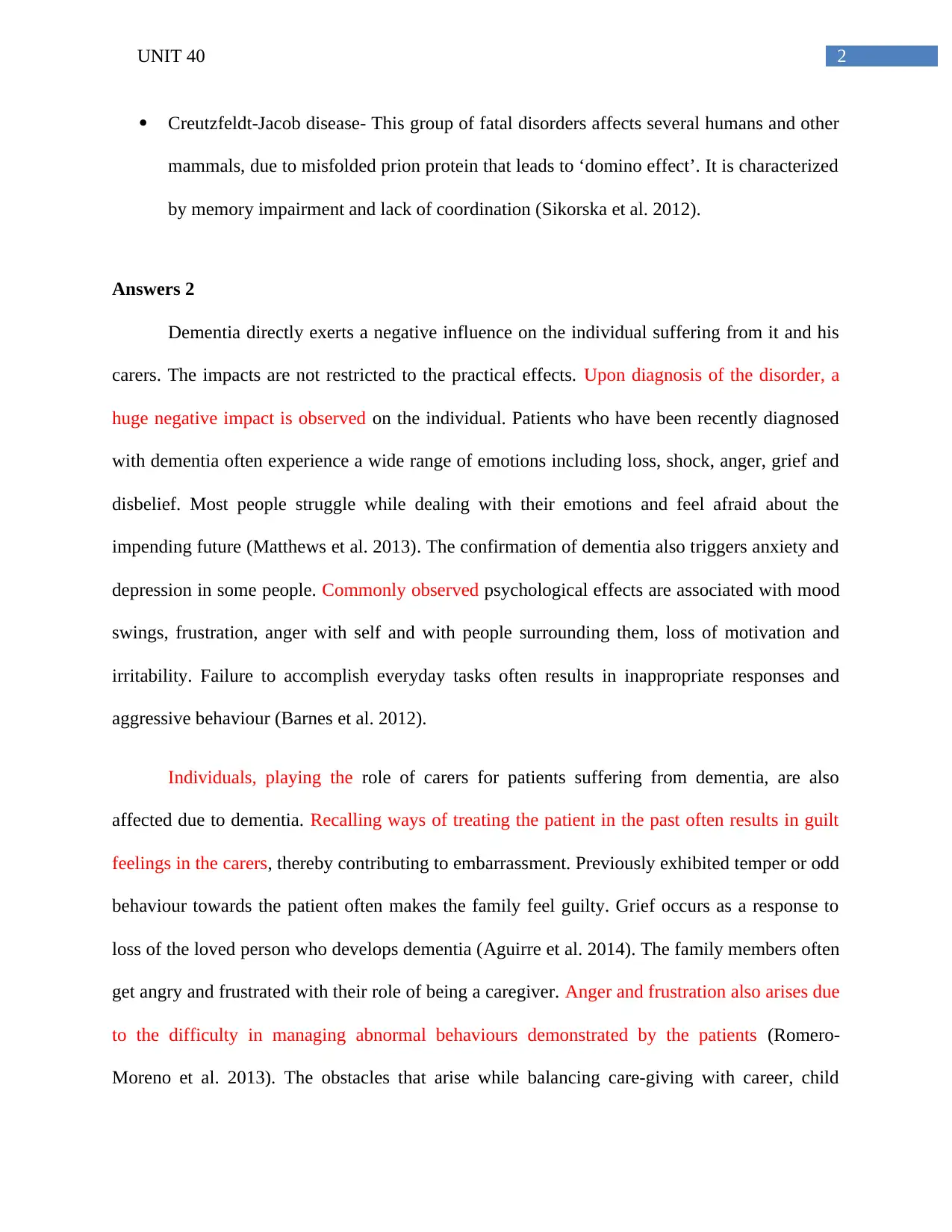
2UNIT 40
Creutzfeldt-Jacob disease- This group of fatal disorders affects several humans and other
mammals, due to misfolded prion protein that leads to ‘domino effect’. It is characterized
by memory impairment and lack of coordination (Sikorska et al. 2012).
Answers 2
Dementia directly exerts a negative influence on the individual suffering from it and his
carers. The impacts are not restricted to the practical effects. Upon diagnosis of the disorder, a
huge negative impact is observed on the individual. Patients who have been recently diagnosed
with dementia often experience a wide range of emotions including loss, shock, anger, grief and
disbelief. Most people struggle while dealing with their emotions and feel afraid about the
impending future (Matthews et al. 2013). The confirmation of dementia also triggers anxiety and
depression in some people. Commonly observed psychological effects are associated with mood
swings, frustration, anger with self and with people surrounding them, loss of motivation and
irritability. Failure to accomplish everyday tasks often results in inappropriate responses and
aggressive behaviour (Barnes et al. 2012).
Individuals, playing the role of carers for patients suffering from dementia, are also
affected due to dementia. Recalling ways of treating the patient in the past often results in guilt
feelings in the carers, thereby contributing to embarrassment. Previously exhibited temper or odd
behaviour towards the patient often makes the family feel guilty. Grief occurs as a response to
loss of the loved person who develops dementia (Aguirre et al. 2014). The family members often
get angry and frustrated with their role of being a caregiver. Anger and frustration also arises due
to the difficulty in managing abnormal behaviours demonstrated by the patients (Romero-
Moreno et al. 2013). The obstacles that arise while balancing care-giving with career, child
Creutzfeldt-Jacob disease- This group of fatal disorders affects several humans and other
mammals, due to misfolded prion protein that leads to ‘domino effect’. It is characterized
by memory impairment and lack of coordination (Sikorska et al. 2012).
Answers 2
Dementia directly exerts a negative influence on the individual suffering from it and his
carers. The impacts are not restricted to the practical effects. Upon diagnosis of the disorder, a
huge negative impact is observed on the individual. Patients who have been recently diagnosed
with dementia often experience a wide range of emotions including loss, shock, anger, grief and
disbelief. Most people struggle while dealing with their emotions and feel afraid about the
impending future (Matthews et al. 2013). The confirmation of dementia also triggers anxiety and
depression in some people. Commonly observed psychological effects are associated with mood
swings, frustration, anger with self and with people surrounding them, loss of motivation and
irritability. Failure to accomplish everyday tasks often results in inappropriate responses and
aggressive behaviour (Barnes et al. 2012).
Individuals, playing the role of carers for patients suffering from dementia, are also
affected due to dementia. Recalling ways of treating the patient in the past often results in guilt
feelings in the carers, thereby contributing to embarrassment. Previously exhibited temper or odd
behaviour towards the patient often makes the family feel guilty. Grief occurs as a response to
loss of the loved person who develops dementia (Aguirre et al. 2014). The family members often
get angry and frustrated with their role of being a caregiver. Anger and frustration also arises due
to the difficulty in managing abnormal behaviours demonstrated by the patients (Romero-
Moreno et al. 2013). The obstacles that arise while balancing care-giving with career, child
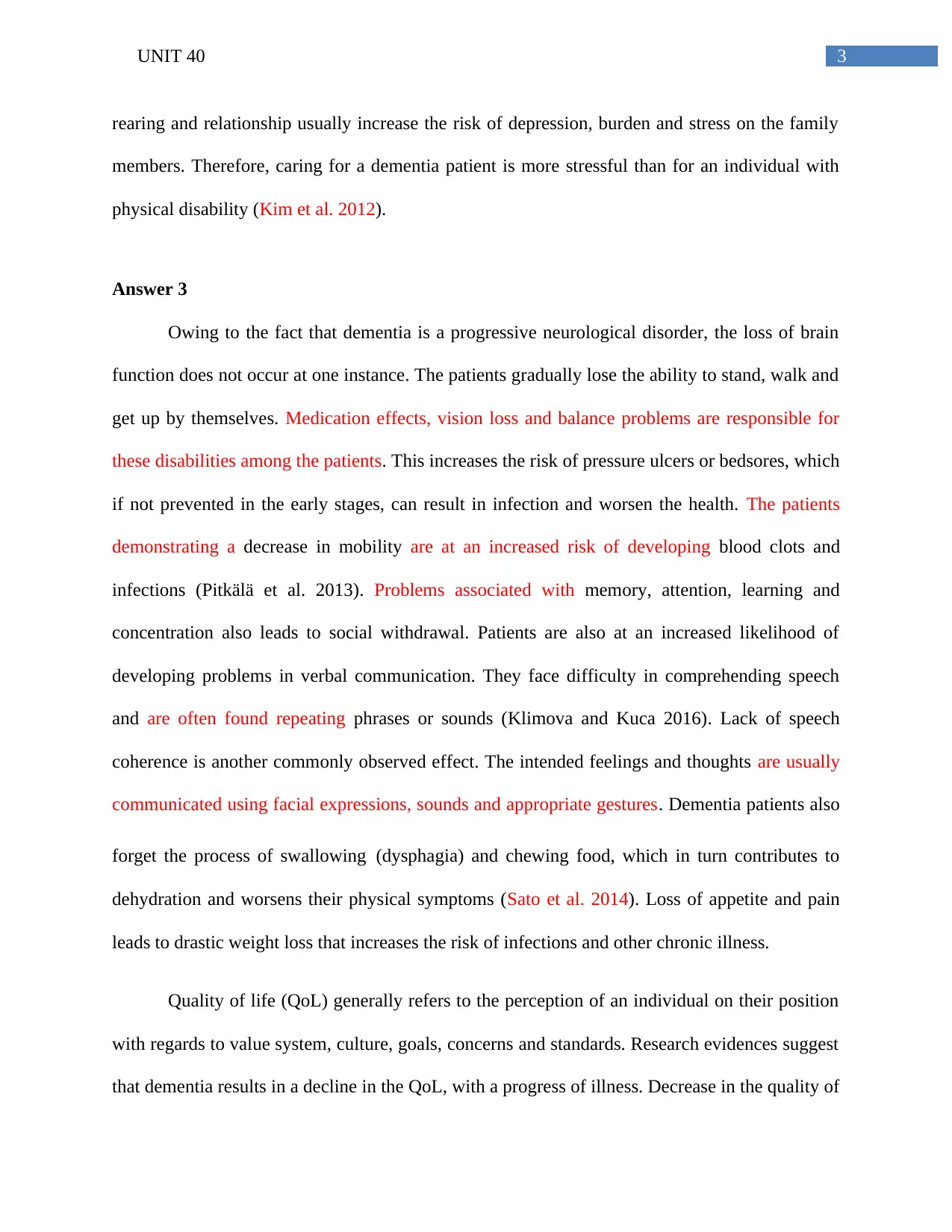
3UNIT 40
rearing and relationship usually increase the risk of depression, burden and stress on the family
members. Therefore, caring for a dementia patient is more stressful than for an individual with
physical disability (Kim et al. 2012).
Answer 3
Owing to the fact that dementia is a progressive neurological disorder, the loss of brain
function does not occur at one instance. The patients gradually lose the ability to stand, walk and
get up by themselves. Medication effects, vision loss and balance problems are responsible for
these disabilities among the patients. This increases the risk of pressure ulcers or bedsores, which
if not prevented in the early stages, can result in infection and worsen the health. The patients
demonstrating a decrease in mobility are at an increased risk of developing blood clots and
infections (Pitkälä et al. 2013). Problems associated with memory, attention, learning and
concentration also leads to social withdrawal. Patients are also at an increased likelihood of
developing problems in verbal communication. They face difficulty in comprehending speech
and are often found repeating phrases or sounds (Klimova and Kuca 2016). Lack of speech
coherence is another commonly observed effect. The intended feelings and thoughts are usually
communicated using facial expressions, sounds and appropriate gestures. Dementia patients also
forget the process of swallowing (dysphagia) and chewing food, which in turn contributes to
dehydration and worsens their physical symptoms (Sato et al. 2014). Loss of appetite and pain
leads to drastic weight loss that increases the risk of infections and other chronic illness.
Quality of life (QoL) generally refers to the perception of an individual on their position
with regards to value system, culture, goals, concerns and standards. Research evidences suggest
that dementia results in a decline in the QoL, with a progress of illness. Decrease in the quality of
rearing and relationship usually increase the risk of depression, burden and stress on the family
members. Therefore, caring for a dementia patient is more stressful than for an individual with
physical disability (Kim et al. 2012).
Answer 3
Owing to the fact that dementia is a progressive neurological disorder, the loss of brain
function does not occur at one instance. The patients gradually lose the ability to stand, walk and
get up by themselves. Medication effects, vision loss and balance problems are responsible for
these disabilities among the patients. This increases the risk of pressure ulcers or bedsores, which
if not prevented in the early stages, can result in infection and worsen the health. The patients
demonstrating a decrease in mobility are at an increased risk of developing blood clots and
infections (Pitkälä et al. 2013). Problems associated with memory, attention, learning and
concentration also leads to social withdrawal. Patients are also at an increased likelihood of
developing problems in verbal communication. They face difficulty in comprehending speech
and are often found repeating phrases or sounds (Klimova and Kuca 2016). Lack of speech
coherence is another commonly observed effect. The intended feelings and thoughts are usually
communicated using facial expressions, sounds and appropriate gestures. Dementia patients also
forget the process of swallowing (dysphagia) and chewing food, which in turn contributes to
dehydration and worsens their physical symptoms (Sato et al. 2014). Loss of appetite and pain
leads to drastic weight loss that increases the risk of infections and other chronic illness.
Quality of life (QoL) generally refers to the perception of an individual on their position
with regards to value system, culture, goals, concerns and standards. Research evidences suggest
that dementia results in a decline in the QoL, with a progress of illness. Decrease in the quality of
Secure Best Marks with AI Grader
Need help grading? Try our AI Grader for instant feedback on your assignments.
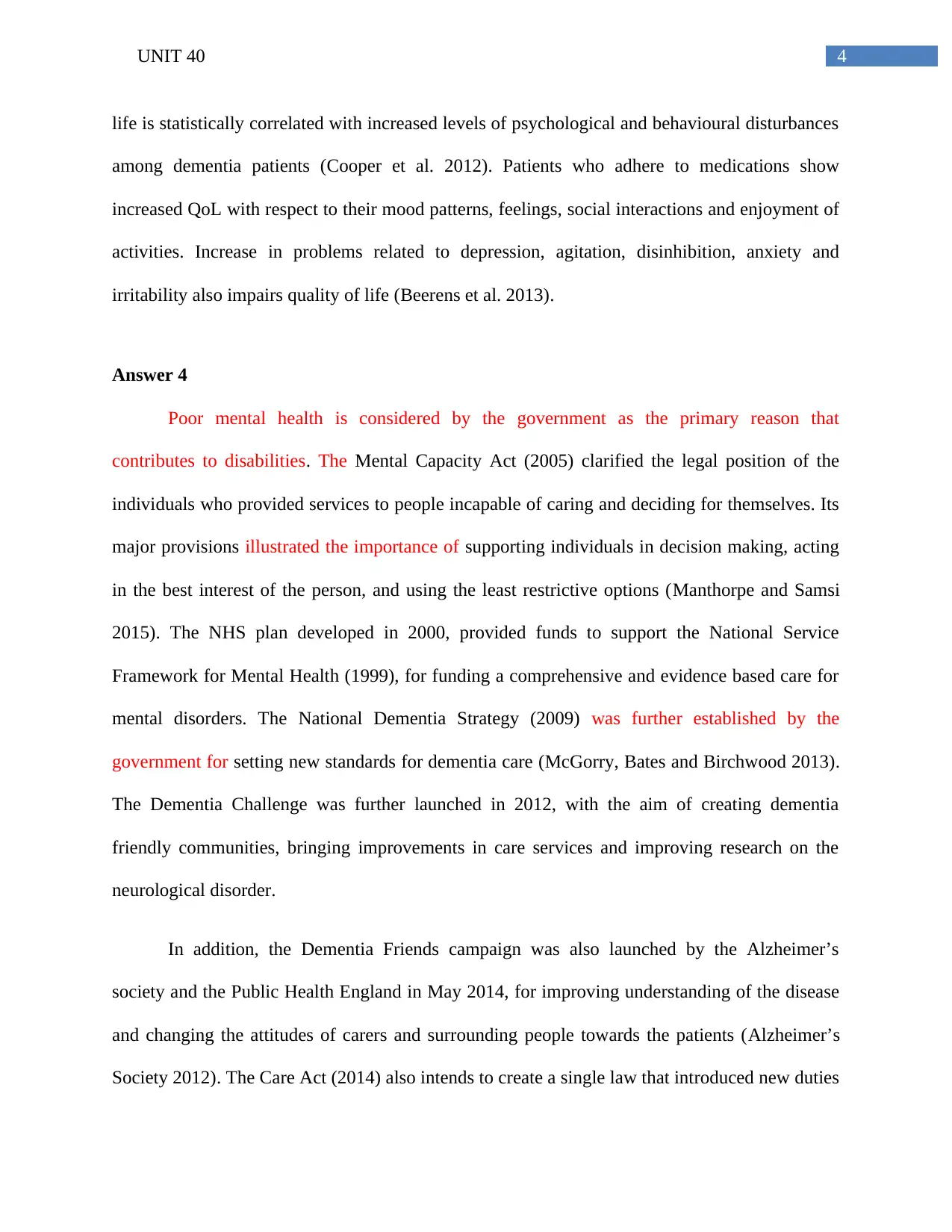
4UNIT 40
life is statistically correlated with increased levels of psychological and behavioural disturbances
among dementia patients (Cooper et al. 2012). Patients who adhere to medications show
increased QoL with respect to their mood patterns, feelings, social interactions and enjoyment of
activities. Increase in problems related to depression, agitation, disinhibition, anxiety and
irritability also impairs quality of life (Beerens et al. 2013).
Answer 4
Poor mental health is considered by the government as the primary reason that
contributes to disabilities. The Mental Capacity Act (2005) clarified the legal position of the
individuals who provided services to people incapable of caring and deciding for themselves. Its
major provisions illustrated the importance of supporting individuals in decision making, acting
in the best interest of the person, and using the least restrictive options (Manthorpe and Samsi
2015). The NHS plan developed in 2000, provided funds to support the National Service
Framework for Mental Health (1999), for funding a comprehensive and evidence based care for
mental disorders. The National Dementia Strategy (2009) was further established by the
government for setting new standards for dementia care (McGorry, Bates and Birchwood 2013).
The Dementia Challenge was further launched in 2012, with the aim of creating dementia
friendly communities, bringing improvements in care services and improving research on the
neurological disorder.
In addition, the Dementia Friends campaign was also launched by the Alzheimer’s
society and the Public Health England in May 2014, for improving understanding of the disease
and changing the attitudes of carers and surrounding people towards the patients (Alzheimer’s
Society 2012). The Care Act (2014) also intends to create a single law that introduced new duties
life is statistically correlated with increased levels of psychological and behavioural disturbances
among dementia patients (Cooper et al. 2012). Patients who adhere to medications show
increased QoL with respect to their mood patterns, feelings, social interactions and enjoyment of
activities. Increase in problems related to depression, agitation, disinhibition, anxiety and
irritability also impairs quality of life (Beerens et al. 2013).
Answer 4
Poor mental health is considered by the government as the primary reason that
contributes to disabilities. The Mental Capacity Act (2005) clarified the legal position of the
individuals who provided services to people incapable of caring and deciding for themselves. Its
major provisions illustrated the importance of supporting individuals in decision making, acting
in the best interest of the person, and using the least restrictive options (Manthorpe and Samsi
2015). The NHS plan developed in 2000, provided funds to support the National Service
Framework for Mental Health (1999), for funding a comprehensive and evidence based care for
mental disorders. The National Dementia Strategy (2009) was further established by the
government for setting new standards for dementia care (McGorry, Bates and Birchwood 2013).
The Dementia Challenge was further launched in 2012, with the aim of creating dementia
friendly communities, bringing improvements in care services and improving research on the
neurological disorder.
In addition, the Dementia Friends campaign was also launched by the Alzheimer’s
society and the Public Health England in May 2014, for improving understanding of the disease
and changing the attitudes of carers and surrounding people towards the patients (Alzheimer’s
Society 2012). The Care Act (2014) also intends to create a single law that introduced new duties

5UNIT 40
on the local authorities, thereby creating a major impact on the life of the patients and the carers
(Legislation.gov.uk 2018). Therefore, the aforementioned policies have created significant
impact on awareness regarding mental health.
on the local authorities, thereby creating a major impact on the life of the patients and the carers
(Legislation.gov.uk 2018). Therefore, the aforementioned policies have created significant
impact on awareness regarding mental health.
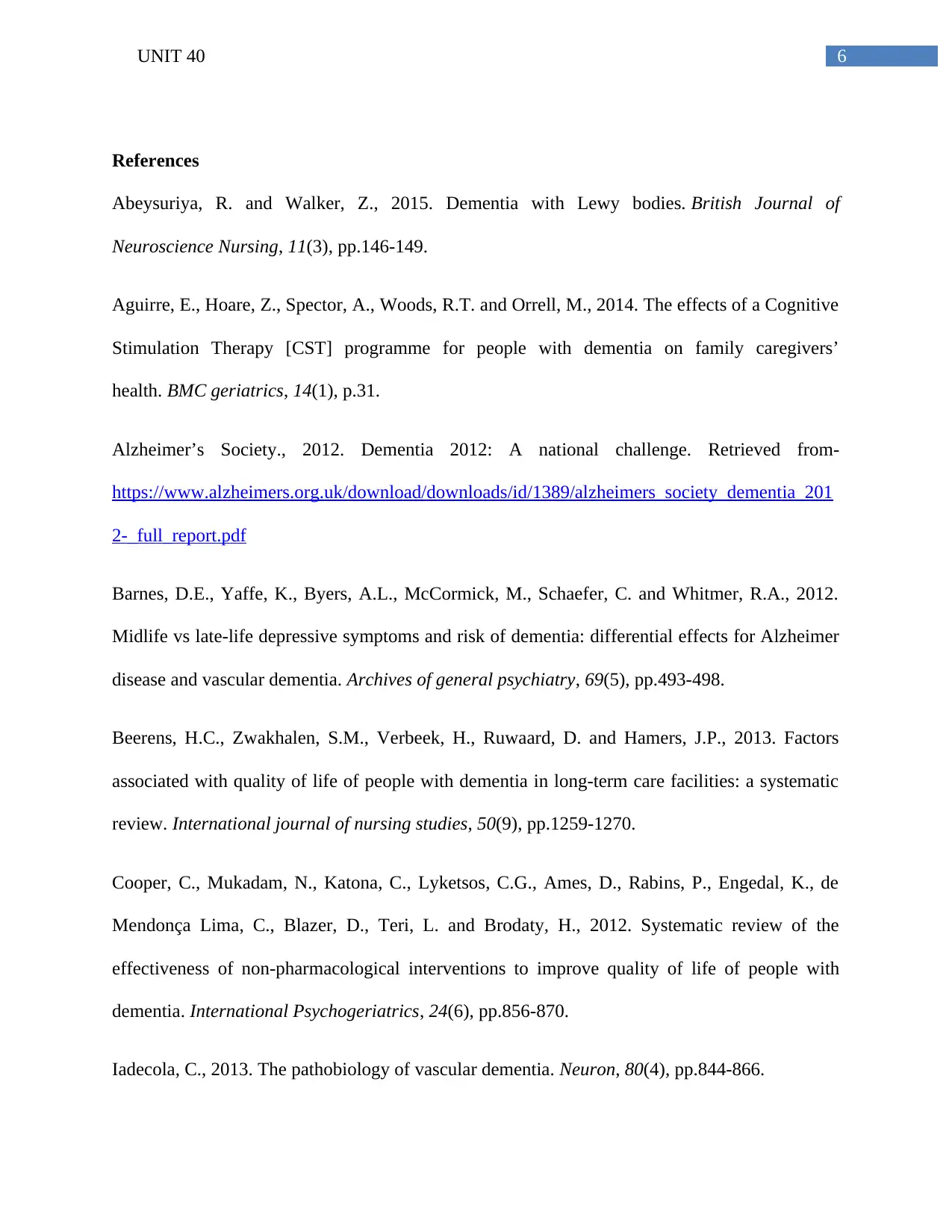
6UNIT 40
References
Abeysuriya, R. and Walker, Z., 2015. Dementia with Lewy bodies. British Journal of
Neuroscience Nursing, 11(3), pp.146-149.
Aguirre, E., Hoare, Z., Spector, A., Woods, R.T. and Orrell, M., 2014. The effects of a Cognitive
Stimulation Therapy [CST] programme for people with dementia on family caregivers’
health. BMC geriatrics, 14(1), p.31.
Alzheimer’s Society., 2012. Dementia 2012: A national challenge. Retrieved from-
https://www.alzheimers.org.uk/download/downloads/id/1389/alzheimers_society_dementia_201
2-_full_report.pdf
Barnes, D.E., Yaffe, K., Byers, A.L., McCormick, M., Schaefer, C. and Whitmer, R.A., 2012.
Midlife vs late-life depressive symptoms and risk of dementia: differential effects for Alzheimer
disease and vascular dementia. Archives of general psychiatry, 69(5), pp.493-498.
Beerens, H.C., Zwakhalen, S.M., Verbeek, H., Ruwaard, D. and Hamers, J.P., 2013. Factors
associated with quality of life of people with dementia in long-term care facilities: a systematic
review. International journal of nursing studies, 50(9), pp.1259-1270.
Cooper, C., Mukadam, N., Katona, C., Lyketsos, C.G., Ames, D., Rabins, P., Engedal, K., de
Mendonça Lima, C., Blazer, D., Teri, L. and Brodaty, H., 2012. Systematic review of the
effectiveness of non-pharmacological interventions to improve quality of life of people with
dementia. International Psychogeriatrics, 24(6), pp.856-870.
Iadecola, C., 2013. The pathobiology of vascular dementia. Neuron, 80(4), pp.844-866.
References
Abeysuriya, R. and Walker, Z., 2015. Dementia with Lewy bodies. British Journal of
Neuroscience Nursing, 11(3), pp.146-149.
Aguirre, E., Hoare, Z., Spector, A., Woods, R.T. and Orrell, M., 2014. The effects of a Cognitive
Stimulation Therapy [CST] programme for people with dementia on family caregivers’
health. BMC geriatrics, 14(1), p.31.
Alzheimer’s Society., 2012. Dementia 2012: A national challenge. Retrieved from-
https://www.alzheimers.org.uk/download/downloads/id/1389/alzheimers_society_dementia_201
2-_full_report.pdf
Barnes, D.E., Yaffe, K., Byers, A.L., McCormick, M., Schaefer, C. and Whitmer, R.A., 2012.
Midlife vs late-life depressive symptoms and risk of dementia: differential effects for Alzheimer
disease and vascular dementia. Archives of general psychiatry, 69(5), pp.493-498.
Beerens, H.C., Zwakhalen, S.M., Verbeek, H., Ruwaard, D. and Hamers, J.P., 2013. Factors
associated with quality of life of people with dementia in long-term care facilities: a systematic
review. International journal of nursing studies, 50(9), pp.1259-1270.
Cooper, C., Mukadam, N., Katona, C., Lyketsos, C.G., Ames, D., Rabins, P., Engedal, K., de
Mendonça Lima, C., Blazer, D., Teri, L. and Brodaty, H., 2012. Systematic review of the
effectiveness of non-pharmacological interventions to improve quality of life of people with
dementia. International Psychogeriatrics, 24(6), pp.856-870.
Iadecola, C., 2013. The pathobiology of vascular dementia. Neuron, 80(4), pp.844-866.
Paraphrase This Document
Need a fresh take? Get an instant paraphrase of this document with our AI Paraphraser
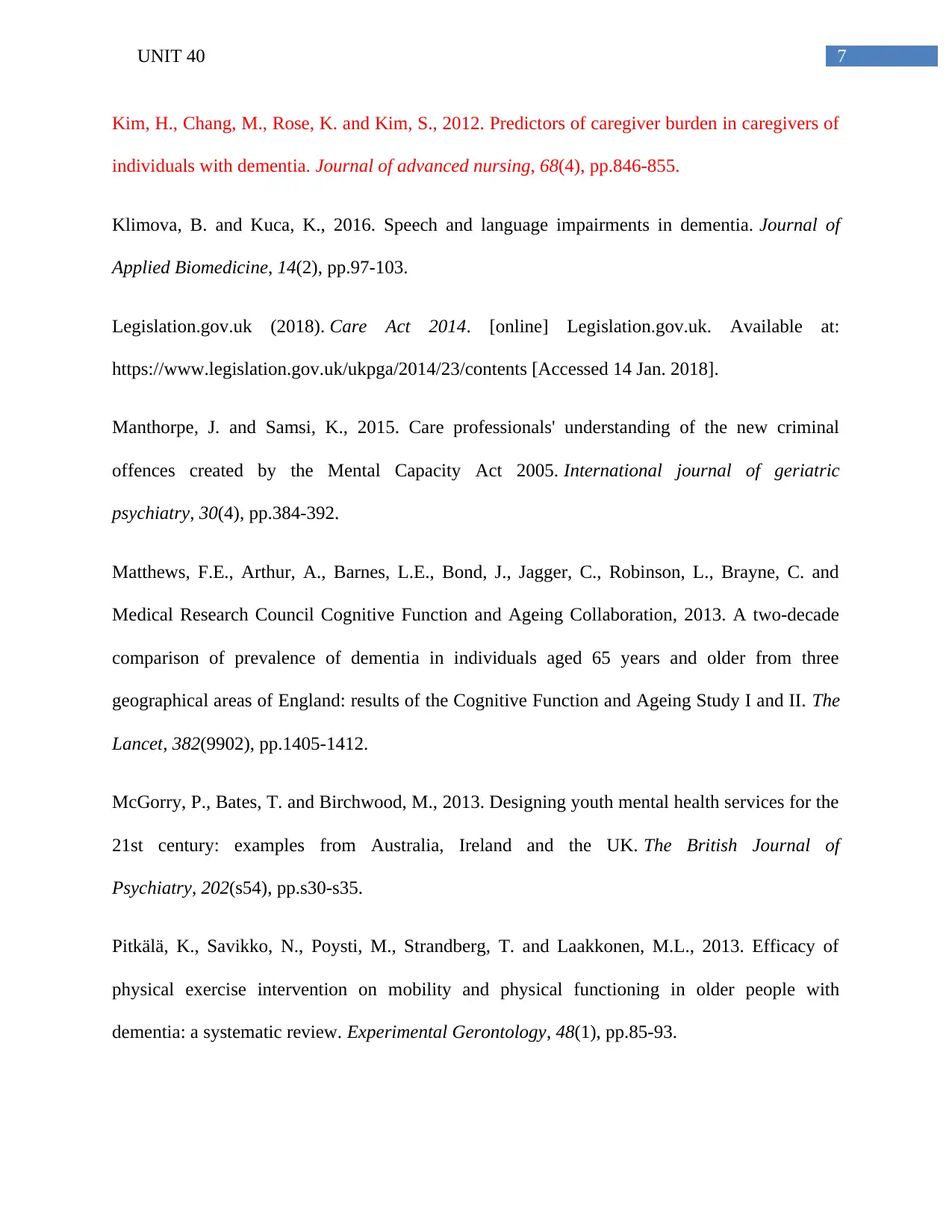
7UNIT 40
Kim, H., Chang, M., Rose, K. and Kim, S., 2012. Predictors of caregiver burden in caregivers of
individuals with dementia. Journal of advanced nursing, 68(4), pp.846-855.
Klimova, B. and Kuca, K., 2016. Speech and language impairments in dementia. Journal of
Applied Biomedicine, 14(2), pp.97-103.
Legislation.gov.uk (2018). Care Act 2014. [online] Legislation.gov.uk. Available at:
https://www.legislation.gov.uk/ukpga/2014/23/contents [Accessed 14 Jan. 2018].
Manthorpe, J. and Samsi, K., 2015. Care professionals' understanding of the new criminal
offences created by the Mental Capacity Act 2005. International journal of geriatric
psychiatry, 30(4), pp.384-392.
Matthews, F.E., Arthur, A., Barnes, L.E., Bond, J., Jagger, C., Robinson, L., Brayne, C. and
Medical Research Council Cognitive Function and Ageing Collaboration, 2013. A two-decade
comparison of prevalence of dementia in individuals aged 65 years and older from three
geographical areas of England: results of the Cognitive Function and Ageing Study I and II. The
Lancet, 382(9902), pp.1405-1412.
McGorry, P., Bates, T. and Birchwood, M., 2013. Designing youth mental health services for the
21st century: examples from Australia, Ireland and the UK. The British Journal of
Psychiatry, 202(s54), pp.s30-s35.
Pitkälä, K., Savikko, N., Poysti, M., Strandberg, T. and Laakkonen, M.L., 2013. Efficacy of
physical exercise intervention on mobility and physical functioning in older people with
dementia: a systematic review. Experimental Gerontology, 48(1), pp.85-93.
Kim, H., Chang, M., Rose, K. and Kim, S., 2012. Predictors of caregiver burden in caregivers of
individuals with dementia. Journal of advanced nursing, 68(4), pp.846-855.
Klimova, B. and Kuca, K., 2016. Speech and language impairments in dementia. Journal of
Applied Biomedicine, 14(2), pp.97-103.
Legislation.gov.uk (2018). Care Act 2014. [online] Legislation.gov.uk. Available at:
https://www.legislation.gov.uk/ukpga/2014/23/contents [Accessed 14 Jan. 2018].
Manthorpe, J. and Samsi, K., 2015. Care professionals' understanding of the new criminal
offences created by the Mental Capacity Act 2005. International journal of geriatric
psychiatry, 30(4), pp.384-392.
Matthews, F.E., Arthur, A., Barnes, L.E., Bond, J., Jagger, C., Robinson, L., Brayne, C. and
Medical Research Council Cognitive Function and Ageing Collaboration, 2013. A two-decade
comparison of prevalence of dementia in individuals aged 65 years and older from three
geographical areas of England: results of the Cognitive Function and Ageing Study I and II. The
Lancet, 382(9902), pp.1405-1412.
McGorry, P., Bates, T. and Birchwood, M., 2013. Designing youth mental health services for the
21st century: examples from Australia, Ireland and the UK. The British Journal of
Psychiatry, 202(s54), pp.s30-s35.
Pitkälä, K., Savikko, N., Poysti, M., Strandberg, T. and Laakkonen, M.L., 2013. Efficacy of
physical exercise intervention on mobility and physical functioning in older people with
dementia: a systematic review. Experimental Gerontology, 48(1), pp.85-93.
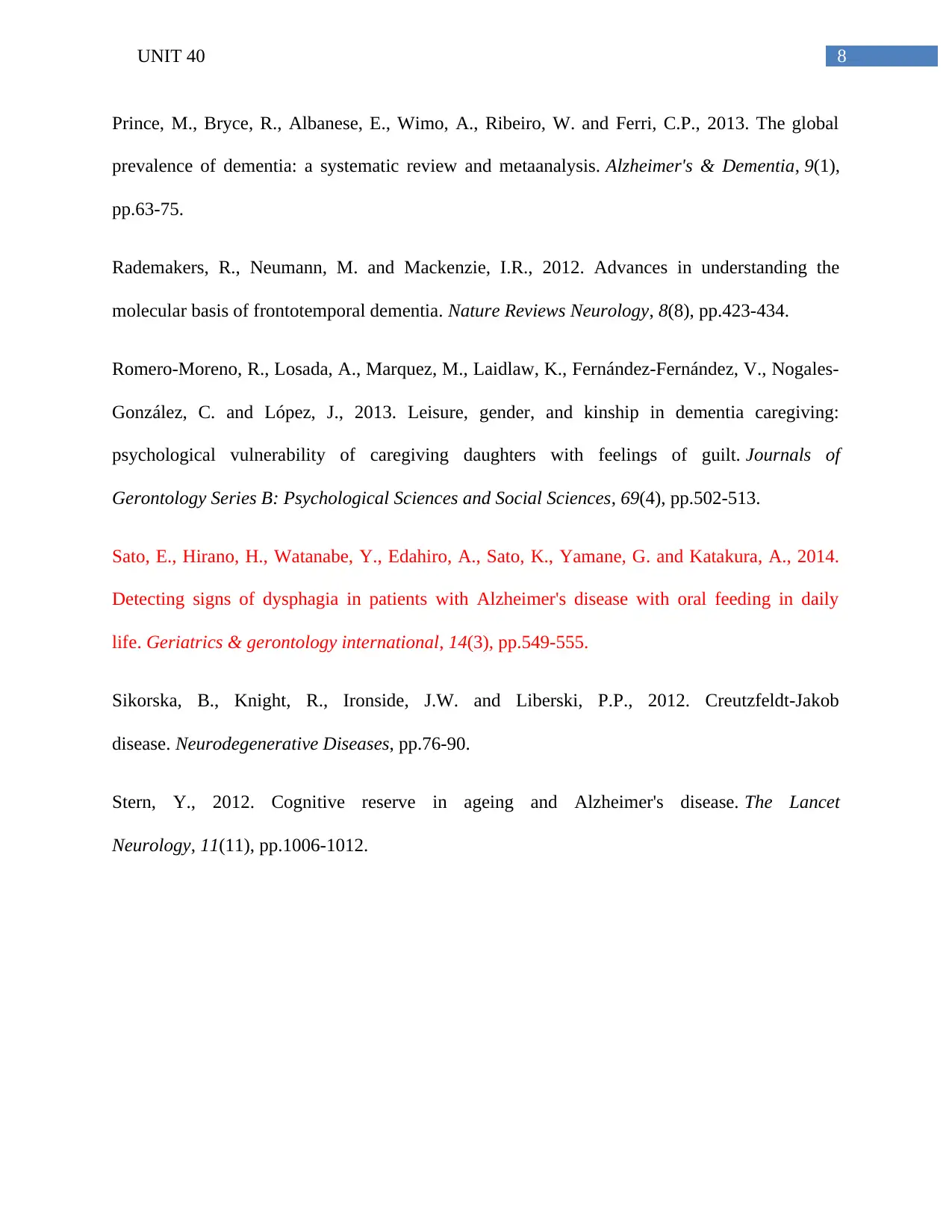
8UNIT 40
Prince, M., Bryce, R., Albanese, E., Wimo, A., Ribeiro, W. and Ferri, C.P., 2013. The global
prevalence of dementia: a systematic review and metaanalysis. Alzheimer's & Dementia, 9(1),
pp.63-75.
Rademakers, R., Neumann, M. and Mackenzie, I.R., 2012. Advances in understanding the
molecular basis of frontotemporal dementia. Nature Reviews Neurology, 8(8), pp.423-434.
Romero-Moreno, R., Losada, A., Marquez, M., Laidlaw, K., Fernández-Fernández, V., Nogales-
González, C. and López, J., 2013. Leisure, gender, and kinship in dementia caregiving:
psychological vulnerability of caregiving daughters with feelings of guilt. Journals of
Gerontology Series B: Psychological Sciences and Social Sciences, 69(4), pp.502-513.
Sato, E., Hirano, H., Watanabe, Y., Edahiro, A., Sato, K., Yamane, G. and Katakura, A., 2014.
Detecting signs of dysphagia in patients with Alzheimer's disease with oral feeding in daily
life. Geriatrics & gerontology international, 14(3), pp.549-555.
Sikorska, B., Knight, R., Ironside, J.W. and Liberski, P.P., 2012. Creutzfeldt-Jakob
disease. Neurodegenerative Diseases, pp.76-90.
Stern, Y., 2012. Cognitive reserve in ageing and Alzheimer's disease. The Lancet
Neurology, 11(11), pp.1006-1012.
Prince, M., Bryce, R., Albanese, E., Wimo, A., Ribeiro, W. and Ferri, C.P., 2013. The global
prevalence of dementia: a systematic review and metaanalysis. Alzheimer's & Dementia, 9(1),
pp.63-75.
Rademakers, R., Neumann, M. and Mackenzie, I.R., 2012. Advances in understanding the
molecular basis of frontotemporal dementia. Nature Reviews Neurology, 8(8), pp.423-434.
Romero-Moreno, R., Losada, A., Marquez, M., Laidlaw, K., Fernández-Fernández, V., Nogales-
González, C. and López, J., 2013. Leisure, gender, and kinship in dementia caregiving:
psychological vulnerability of caregiving daughters with feelings of guilt. Journals of
Gerontology Series B: Psychological Sciences and Social Sciences, 69(4), pp.502-513.
Sato, E., Hirano, H., Watanabe, Y., Edahiro, A., Sato, K., Yamane, G. and Katakura, A., 2014.
Detecting signs of dysphagia in patients with Alzheimer's disease with oral feeding in daily
life. Geriatrics & gerontology international, 14(3), pp.549-555.
Sikorska, B., Knight, R., Ironside, J.W. and Liberski, P.P., 2012. Creutzfeldt-Jakob
disease. Neurodegenerative Diseases, pp.76-90.
Stern, Y., 2012. Cognitive reserve in ageing and Alzheimer's disease. The Lancet
Neurology, 11(11), pp.1006-1012.

9UNIT 40
1 out of 10
Related Documents
Your All-in-One AI-Powered Toolkit for Academic Success.
+13062052269
info@desklib.com
Available 24*7 on WhatsApp / Email
![[object Object]](/_next/static/media/star-bottom.7253800d.svg)
Unlock your academic potential
© 2024 | Zucol Services PVT LTD | All rights reserved.





